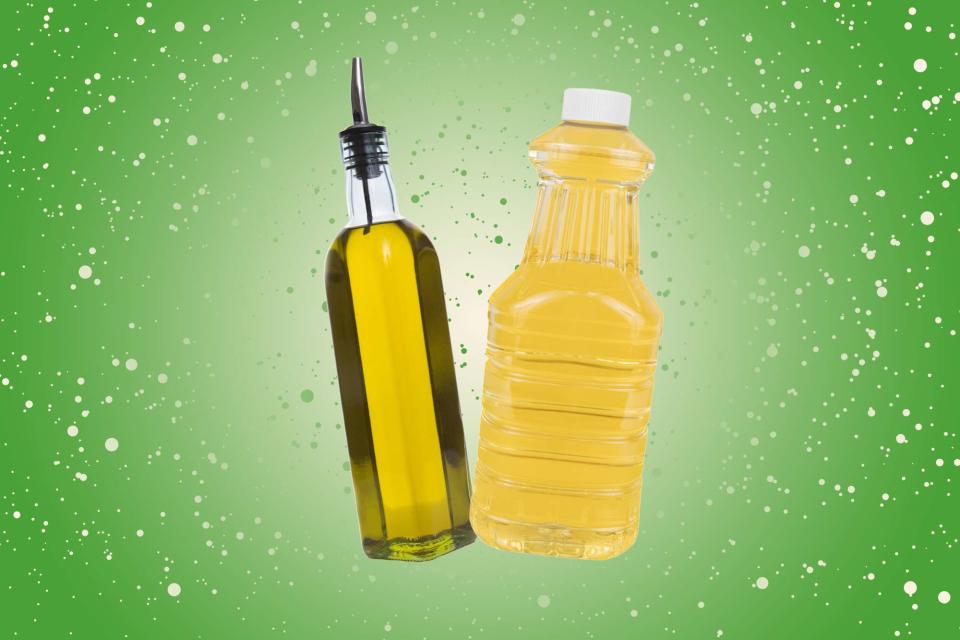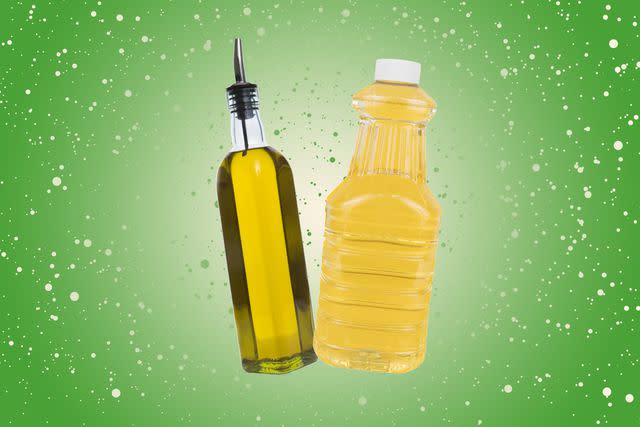Can You Use Olive Oil Instead of Vegetable Oil?
Find out when you can make the swap plus how they stack up nutritionally.

Reviewed by Dietitian Emily Lachtrupp, M.S., RD
As a professional recipe developer and dietitian, I write recipes that call for specific ingredients, such as pistachios or whole-wheat flour, for health and culinary reasons. But as a very busy mom of four, I often substitute the ingredients I have in my pantry when cooking for my family because a "quick trip" to the store requires me to strap twin 2-year-olds into the car. Knowing which substitutions will still produce the desired taste has come from years of successes and failures, but when it comes to oils, there are distinct differences among all of them.
Picking an oil for your recipe depends on several factors. Are you whisking together a salad dressing, making fried rice, or baking a cake? Each type of oil has its own flavor, smoke point and viscosity, so it's important to take an oil's qualities into account when making a swap.
To keep things simple and your precious pantry space free of clutter, you may be asking, can you use olive oil instead of vegetable oil? The answer is yes but not all the time. Read on to find out when you should—and shouldn't—substitute olive oil for vegetable oil.

What Is Olive Oil?
Olive oil is made by mechanically crushing or grinding olives to extract their oil. Extra-virgin and virgin olive oils are unrefined, pure oils that have a grassy, peppery and floral flavor, and, much like wine, these can taste different depending on where the olives are grown. Other types of olive oil can be heavily refined, and often have a more neutral flavor and lighter color. Because it's more expensive to produce extra-virgin olive oil than refined oils, we most often use it in instances where the flavor of the oil can be appreciated, such as in salad dressings and for sautéing and roasting vegetables.
Related: Regular vs. Extra-Virgin Olive Oil: What's the Difference?
What Is Vegetable Oil?
Vegetable oil is the broad term used for any oil made from plant seeds or grains, such as grapeseed, canola, cottonseed, sunflower, soybean, corn and safflower. You can purchase these oils as single-origin oils, like canola oil, for example, or as a blend simply labeled "vegetable oil." To extract the oils from these seeds and grains, and to keep them shelf-stable and neutral in flavor, these vegetable oils are refined, sometimes using heat and chemicals.
Vegetable oil tends to be considerably less expensive and is commonly used when a large quantity of oil is needed, such as when frying or making large batches of quick breads. It also tends to be more heat-stable than extra-virgin olive oil, so it's the oil of choice for high-heat cooking, such as in wok-cooking.
Is It Healthier to Use Olive Oil Instead of Vegetable Oil?
While the calorie and total fat content of olive oil versus vegetable oil is essentially the same, the type of fat is different. Extra-virgin olive oil has a higher proportion of beneficial monounsaturated fats, and less polyunsaturated and saturated fat. Swapping out saturated fat for unsaturated fats has been shown to reduce mortality, but consuming monounsaturated fat, specifically, has been shown to reduce blood pressure, improve cholesterol, reduce breast cancer risk and aid in weight control.
Related: Is Olive Oil Healthy?
Specifically, extra-virgin olive oil contains the antioxidants vitamin E and oleuropein, which fight free radicals and reduce inflammation. Oleuropein might also protect against diabetes.
Nutrition Information for Extra-Virgin Olive Oil vs. Vegetable Oil
Per the USDA, a 1-tablespoon serving of each oil contains:
119 calories | 124 calories |
14 g total fat | 14 g total fat |
2 g saturated fat | 2 g saturated fat |
10 g monounsaturated fat | 6 g monounsaturated fat |
1 g polyunsaturated fat | 6 g polyunsaturated fat |
0 g carbohydrate | 0 g carbohydrate |
0 g protein | 0 g protein |
Frequently Asked Questions
Can you use olive oil instead of vegetable oil for baking a cake?
And what can you use instead of vegetable oil in a cake mix? According to Susan Reid, chef and baker extraordinaire at King Arthur Baking Company, "If a cake calls for oil you can absolutely use olive oil as the vegetable oil, but I would recommend a light or neutral-flavored oil." In particular, "for a vanilla or white cake, you don't want to muddy the flavor with olive oil."
According to Reid, the best time to use olive oil in a cake mix is when you're making chocolate cake. "Extra-virgin oils that have a spicy flavor profile can be excellent with chocolate cakes. Fruitier ones pair very well with citrus."
See More: Healthy Baking Recipes with Olive Oil
Can you use olive oil instead of vegetable oil for sautéing and stir-frying?
The short answer is yes.
The longer answer is this: You might have heard that extra-virgin olive oil should be reserved for salad dressings and drizzling because of its low smoke point, the temperature at which the oil stops shimmering and starts smoking, but there's more to the story. According to Mary Mori, vice president of quality and R&D for California Olive Ranch, "It's a misnomer that you can't cook with extra-virgin olive oil at high temps." She shared that "the acidity of the oil is tied to the smoke point. The lower the acidity, the lower the impurities and the higher the smoke point. Depending on the quality of the olive oil, some can even go up to 480°F."
Many olive oils don't list their acidity, so it's best to trust your eyes. If the olive oil you're heating up in a pan starts to smoke, pour it out, let the pan cool and start over.
The temperature at which olive oil starts to lose its health benefits and release harmful compounds is higher than conventional wisdom suggests, too. According to a study from the University of California, Davis, even olive oils with the most phenols had a smoke point higher than 400°F. Since most stovetop cooking (and even frying) occurs around 350°F, you can absolutely use olive oil for sautéing and stir-frying.
The thing to keep in mind is that olive oil is flavorful, so do you want to add that flavor to the dish you're cooking? If the answer is yes, go ahead. Otherwise it's best to opt for an oil with a more neutral flavor—think canola or avocado oil.
Can you use olive oil instead of vegetable oil for marinades?
Yes, you can use olive oil instead of vegetable oil for marinades. As mentioned above, the only thing you want to keep in mind is that you're adding additional flavor to your marinade. Extra-virgin olive oil tends to be grassy, peppery and floral, which can be a delicious addition to the flavor of the chicken, shrimp, tofu, beef or other protein you are marinating. However, if the flavor profile of extra-virgin olive oil is not what you are hoping to impart, opt for a lighter olive oil or neutral oil instead.
Can you use olive oil instead of vegetable oil for making dressing?
Yes, you can use olive oil instead of vegetable oil for making dressing. In fact, most people prefer to use olive oil in their salad dressings because oil is a considerable component of salad dressing and the fruity and zesty flavor of extra-virgin olive oil is a welcome addition. One thing to keep in mind is it will solidify in the refrigerator, so you'll want to let the dressing stand at room temperature for 30 minutes or so before using if it's been stored in the fridge.
Can you use olive oil instead of vegetable oil when deep-frying?
Deep-frying occurs at 350°F to 375°F so, technically, olive oil can be used for deep-frying. However, because of the volume of oil you generally need to submerge food for deep-frying, it's not the most economical choice.
Bottom Line
Extra-virgin olive oil is a flavorful, healthy oil to use in dressings, baking, marinades, sautéing, stir-frying and deep-frying, if desired. The health benefits of olive oil include reducing inflammation and helping with maintaining a healthy weight, but olive oil is also more expensive and has a shorter shelf life than vegetable oil. Keeping both in your pantry is ideal, but feel free to swap one for the other whenever you need. No need to schlep yourself, and your kids, to the store if you find yourself with only one kind in the pantry.

